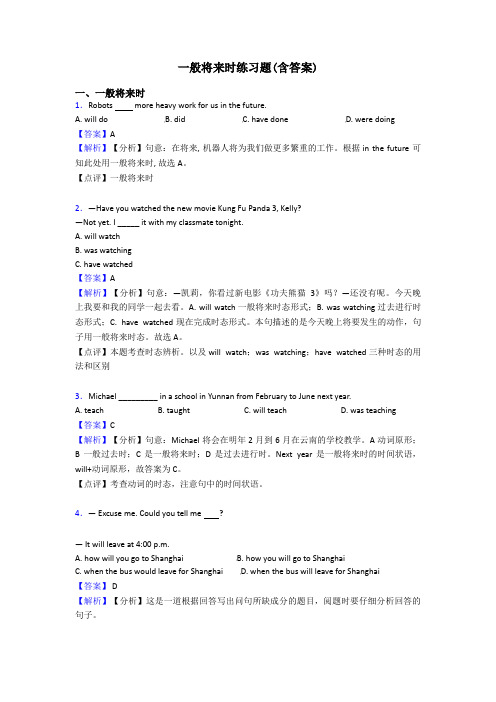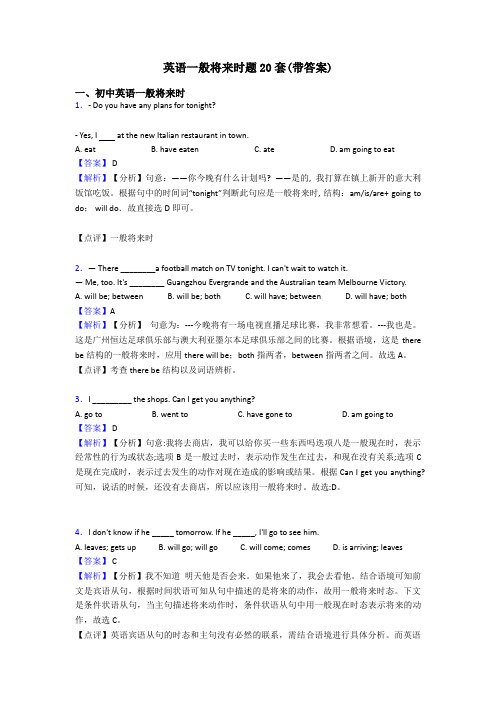完整版一般将来时练习题
- 格式:docx
- 大小:17.53 KB
- 文档页数:4

一般将来时练习题(含答案)一、一般将来时1.Robots more heavy work for us in the future.A. will doB. didC. have doneD. were doing【答案】A【解析】【分析】句意:在将来, 机器人将为我们做更多繁重的工作。
根据in the future 可知此处用一般将来时, 故选A。
【点评】一般将来时2.—Have you watched the new movie Kung Fu Panda 3, Kelly?—Not yet. I _____ it with my classmate tonight.A. will watchB. was watchingC. have watched【答案】A【解析】【分析】句意:—凯莉,你看过新电影《功夫熊猫3》吗?—还没有呢。
今天晚上我要和我的同学一起去看。
A. will watch一般将来时态形式;B. was watching过去进行时态形式;C. have watched现在完成时态形式。
本句描述的是今天晚上将要发生的动作,句子用一般将来时态。
故选A。
【点评】本题考查时态辨析。
以及will watch;was watching;have watched三种时态的用法和区别3.Michael _________ in a school in Yunnan from February to June next year.A. teachB. taughtC. will teachD. was teaching【答案】C【解析】【分析】句意:Michael将会在明年2月到6月在云南的学校教学。
A动词原形;B一般过去时;C是一般将来时;D是过去进行时。
Next year是一般将来时的时间状语,will+动词原形,故答案为C。
【点评】考查动词的时态,注意句中的时间状语。
4.— Excuse me. Could you tell me ?— It will leave at 4:00 p.m.A. how will you go to ShanghaiB. how you will go to ShanghaiC. when the bus would leave for ShanghaiD. when the bus will leave for Shanghai【答案】 D【解析】【分析】这是一道根据回答写出问句所缺成分的题目,阅题时要仔细分析回答的句子。

英语一般将来时练习题20篇一、单项选择一般将来时1.—Help me out in the kitchen and I ________ you to a cup of coffee.—Sounds good.A.will treat B.treatC.am treating D.have treated【答案】A【解析】考查时态。
句意:——要是你在厨房里帮我忙的话,我将请你喝咖啡。
——听起来不错。
根据对话语境可知,应用一般将来时。
2.—I have not heard from Mark for a long time. I'm quite worried about him.—OK. I ___________ you know the minute I hear anything.A.have let B.let C.would let D.will let【答案】D【解析】【详解】考查一般将来时。
句意:——我好久没有马克的音讯了。
我现在挺担心他的。
——好的,我一听到什么消息就会告知你的。
分析语境可知,过去和现在都没有消息,收到消息告知“你”,这件事情只可能在未来发生,故使用一般将来时。
此外,本题易误用虚拟语气,根据从句“the minute I hear anything”使用一般现在时,可排除主句使用虚拟语气。
综上,故选D。
3.Dr. Smith as well as his daughters, visit Beijing this summer.A.isgoingto B.aregoingtoC.wasgoingto D.weregoingto【答案】A【解析】试题分析:考查动词的时态与主谓一致。
句意:史密斯博士和他的女儿今年夏天将要来北京。
A as well as B 谓语动词与A保持一致,所以用单数形式,根据时间状语this summer.用将来时,故选A项。
考点 : 考查动词的时态与主谓一致4.Turn on the television or open a magazine and you ________ advertisements showing happy families.A.will often see B.often seeC.are often seeing D.have often seen【答案】A【解析】考查“祈使句+and +陈述句”句型。

一般将来时测试题130道一、一般将来时态的定义:表示将要发生的动作或存在的状态。
如:(1)表示将要发生的动作:I will see a film tomorrow.我明天将去看一场电影。
(2)表示将来的状态:He will be 10years old next year. 明年他就十岁了。
二、一般将来时的时间标志词:•tonight(今晚)soon(不久;很快)• tomorrow系列:tomorrow morning(明天早上)tomorrow afternoon(明天下午)tomorrow evening(明天晚上)the day after tomorrow(后天)• next系列:next week/ next year/next Monday...• 一段时间+later系列:five years later/three days later…• in +一段时间系列:in five minutes/in two weeks…in the future (在未来)三、一般将来时的一般形式及用法:第1类:will + 动原(1)肯定句:主语+ will + 动原+ 其它。
注意缩写:will = ’ll如:They will go shopping next Friday.= They’ll go shopping next Friday.他们下周五要去购物。
(2)否定句:主语+ will + not + 动原+其它。
注意缩写:will not = won't如:They will not go shopping next Friday.= They won't go shopping next Friday.他们下周五不去购物。
(3)一般疑问句:Will + 主语+ 动原+ 其它? 如:Will they go shopping next Friday?他们下周五要去购物吗?(4)特殊疑问句:特殊疑问词+will + 主语+ 动原+其它?What will they do tomorrow?他们明天将做什么?注意:助动词shall一般主要用于第一人称I或we第2类:be going to + 动原(1)肯定句:主语+ be动词+ going to + 动原+其它.如:They are going to have an English test next week.他们下周有一场英语考试。

英语一般将来时练习题20篇一、单项选择一般将来时1.—Help me out in the kitchen and I ________ you to a cup of coffee.—Sounds good.A.will treat B.treatC.am treating D.have treated【答案】A【解析】考查时态。
句意:——要是你在厨房里帮我忙的话,我将请你喝咖啡。
——听起来不错。
根据对话语境可知,应用一般将来时。
2.—I have not heard from Mark for a long time. I'm quite worried about him.—OK. I ___________ you know the minute I hear anything.A.have let B.let C.would let D.will let【答案】D【解析】【详解】考查一般将来时。
句意:——我好久没有马克的音讯了。
我现在挺担心他的。
——好的,我一听到什么消息就会告知你的。
分析语境可知,过去和现在都没有消息,收到消息告知“你”,这件事情只可能在未来发生,故使用一般将来时。
此外,本题易误用虚拟语气,根据从句“the minute I hear anything”使用一般现在时,可排除主句使用虚拟语气。
综上,故选D。
3.Dr. Smith as well as his daughters, visit Beijing this summer.A.isgoingto B.aregoingtoC.wasgoingto D.weregoingto【答案】A【解析】试题分析:考查动词的时态与主谓一致。
句意:史密斯博士和他的女儿今年夏天将要来北京。
A as well as B 谓语动词与A保持一致,所以用单数形式,根据时间状语this summer.用将来时,故选A项。
考点 : 考查动词的时态与主谓一致4.Turn on the television or open a magazine and you ________ advertisements showing happy families.A.will often see B.often seeC.are often seeing D.have often seen【答案】A【解析】考查“祈使句+and +陈述句”句型。

【英语】一般将来时练习题(含答案)一、一般将来时1.With the development of science and technology, robot cooks ______ in our families in the future.A. appearB. appearedC. will appearD. is appearing【答案】C【解析】【分析】句意:随着科技的发展,机器人厨师将来会出现在我们的家庭中。
A是一般现在时;B是一般过去时;C是一般将来时;D是现在进行时。
句中的in the future是一般将来时的标志,故答案为C。
【点评】考查考查动词的时态,注意时间状语的暗示作用。
2.Michael _________ in a school in Yunnan from February to June next year.A. teachB. taughtC. will teachD. was teaching【答案】C【解析】【分析】句意:Michael将会在明年2月到6月在云南的学校教学。
A动词原形;B一般过去时;C是一般将来时;D是过去进行时。
Next year是一般将来时的时间状语,will+动词原形,故答案为C。
【点评】考查动词的时态,注意句中的时间状语。
3.I _________ the shops. Can I get you anything?A. go toB. went toC. have gone toD. am going to【答案】 D【解析】【分析】句意:我将去商店,我可以给你买一些东西吗迭项八是一般现在时,表示经常性的行为或状态;选项B是一般过去时,表示动作发生在过去,和现在没有关系;选项C 是现在完成时,表示过去发生的动作对现在造成的影响或结果。
根据Can I get you anything?可知,说话的时候,还没有去商店,所以应该用一般将来时。

英语一般将来时题20套(带答案)一、初中英语一般将来时1.- Do you have any plans for tonight?- Yes, I at the new Italian restaurant in town.A. eatB. have eatenC. ateD. am going to eat【答案】 D【解析】【分析】句意:——你今晚有什么计划吗? ——是的, 我打算在镇上新开的意大利饭馆吃饭。
根据句中的时间词“tonight”判断此句应是一般将来时, 结构:am/is/are+ going to do; will do.故直接选D即可。
【点评】一般将来时2.— There ________a football match on TV tonight. I can't wait to watch it.— Me, too. It's ________ Guangzhou Evergrande and the Australian team Melbourne Victory.A. will be; betweenB. will be; bothC. will have; betweenD. will have; both【答案】A【解析】【分析】句意为:---今晚将有一场电视直播足球比赛,我非常想看。
---我也是。
这是广州恒达足球俱乐部与澳大利亚墨尔本足球俱乐部之间的比赛。
根据语境,这是there be结构的一般将来时,应用there will be;both指两者,between指两者之间。
故选A。
【点评】考查there be结构以及词语辨析。
3.I _________ the shops. Can I get you anything?A. go toB. went toC. have gone toD. am going to【答案】 D【解析】【分析】句意:我将去商店,我可以给你买一些东西吗迭项八是一般现在时,表示经常性的行为或状态;选项B是一般过去时,表示动作发生在过去,和现在没有关系;选项C 是现在完成时,表示过去发生的动作对现在造成的影响或结果。
英语一般将来时题20套(带答案)及解析一、初中英语一般将来时1.— I hear Leo will leave for Korea for a meeting.— Really? Do you know when he _______.A. will startB. to startC. started【答案】 A【解析】【分析】句意:——我听说Leo要去韩国开会。
——真的吗?你知道他什么时候出发吗?when何时,此处询问将来的时间,故用一般将来时,因此选A。
【点评】考查动词的时态。
2.Look on the bright side of life,and imagine that you ______ a happy and successful future.A. hadB. will haveC. haveD. have had【答案】 B【解析】【分析】考查时态.句意"看看生活中美好的一面,想象你会有一个幸福和成功的未来.".A过去时.B一般将来时态.C动词原形.D现在完成时态.结合语境"看看生活中美好的一面,想象你___一个幸福和成功的未来.",由future未来,可知,表示将来,用一般将来时态.答案是B.3.I _________ the shops. Can I get you anything?A. go toB. went toC. have gone toD. am going to【答案】 D【解析】【分析】句意:我将去商店,我可以给你买一些东西吗迭项八是一般现在时,表示经常性的行为或状态;选项B是一般过去时,表示动作发生在过去,和现在没有关系;选项C 是现在完成时,表示过去发生的动作对现在造成的影响或结果。
根据Can I get you anything?可知,说话的时候,还没有去商店,所以应该用一般将来时。
故选:D。
4.—Do you have any plans for tonight?—Yes ,I____at the new Italian restaurant in town.A. eatB. have eatenC. ateD. am going to eat【答案】 D【解析】【分析】句意:一今天晚上你有什么计划吗?一是的,我打算到镇上新开的意大利餐馆去吃饭。
一般将来时练习题(含答案)经典一、一般将来时1.— I hear Leo will leave for Korea for a meeting.— Really? Do you know when he _______.A. will startB. to startC. started【答案】 A【解析】【分析】句意:——我听说Leo要去韩国开会。
——真的吗?你知道他什么时候出发吗?when何时,此处询问将来的时间,故用一般将来时,因此选A。
【点评】考查动词的时态。
2.I don't know whether mom _________ me to Beijing next week.A. takeB. takesC. will takeD. would take【答案】 C【解析】【分析】句意:我不知道妈妈下周是否会带我去北京。
分析句子结构可知,此处是宾语从句,主句时态为一般现在时,从句时态根据主现从任原则,再根据从句中的next week可知,从句应该是表示将来的动作,所以用一般将来时,用will do形式,故选C。
【点评】考查宾语从句时态。
注意宾语从句时态的主现从任原则。
3.I’m so lucky because I see more cartoon characters next month.A. is able toB. will be able toC. be able toD. was able to【答案】B【解析】【分析】句意:我真幸运因为我下个月能看到更多的卡通人物。
next month表将来,因此用will be able to。
故选B。
【点评】考查一般将来时。
4.Look on the bright side of life,and imagine that you ______ a happy and successful future.A. hadB. will haveC. haveD. have had【答案】 B【解析】【分析】考查时态.句意"看看生活中美好的一面,想象你会有一个幸福和成功的未来.".A过去时.B一般将来时态.C动词原形.D现在完成时态.结合语境"看看生活中美好的一面,想象你___一个幸福和成功的未来.",由future未来,可知,表示将来,用一般将来时态.答案是B.5.We ________ a party for Kate. It's supposed to be a surprise.A. were havingB. hadC. will haveD. have had【答案】C【解析】【分析】句意:我们将为凯特举办一个聚会。
(英语)英语一般将来时题20套(带答案)含解析一、单项选择一般将来时1.The project to developing the economy and reducing poverty when it is completed. A.has contributed B.had been contributedC.will contribute D.is contribute【答案】C【解析】试题分析:考查动词的时态。
句意:这项工程在竣工后,将会继续发展经济,减少贫穷。
根据句意可知表示将要发生的事情,用一般将来时,选C考点 : 考查动词的时2.As you go through this book, you ________ that each of the millions of people who lived through World War II had a different experience.A.will find B.foundC.had found D.have found【答案】A【解析】试题分析:一般将来时表示将要发生的动作或情况。
在一般将来时的句子中,有时有表示将来时间的状语,有时没有时间状语,这时要从意思上判断是否指未来的动作或情况。
句意:当你通读这本书的时候,你将会发现成千上万的经历过二战的每个人都有不同的经历。
根据句意,判断主语的时态为一般将来时,故选A【考点定位】考查时态。
3.---Do you have any special plan for this weekend?---Yes. I _____ my daughter to Disneyland.A.am going to take B.take C.have taken D.would take【答案】A【解析】试题分析:考查时态。
根据句中的时间状语this weekend,可以判断用将来时。
英语中经常用现在进行时代替将来时。
一般将来时练习题一、选择题1. 他______去北京旅游。
A. will goB. goesC. went2. 明天早上我们______七点出发。
A. are going toB. wentC. go3. 她______成为一名优秀的老师。
A. is going to beC. became4. 我们______在周末举行篮球比赛。
A. will holdB. heldC. hold二、填空题1. 我______(study)英语,为了出国留学。
2. 明年他______(graduate) from university.3. 他们______(build)一座新桥,以方便村民出行。
4. 我们______(have)一个聚会,庆祝考试结束。
三、改写句子1. They will visit the Great Wall next week.改写为:They are going to ______ ______ ______ next week.2. She will be a doctor in the future.改写为:She ______ ______ ______ a doctor in the future.3. We will celebrate the New Year with our family.改写为:We ______ ______ ______ the New Year with our family.四、翻译句子1. 明天我们会去动物园看熊猫。
_____________________________2. 他计划在下个月开始减肥。
_____________________________3. 他们打算在春天种植更多的树木。
_____________________________4. 我将来要成为一名科学家。
_____________________________五、情景对话A: 你长大后想做什么?B: 我______(be)一名画家。
般将来时讲解一、概念:表示将要发生的动作或存在的状态及打算、计划或准备做某事。
句中一般有以下时间状语:Tomorrow , next day(week, mon th, year soo)i, the day after tomorrow (后天)等。
二、基本结构:① be going to + do ; ②will+ do.三、否定句:在be 动词( am, is, are )后加not 或will 后加not 成won't。
例如:I ' m going to have a pic nic this after noon. I ' m not going to have a pic nic this after noon.四、一般疑问句:be 或will 提到句首,some 改为any, and 改为or,第一二人称互换。
例如:We are going to go on an out ing this weeke nd. Are you going to go on an out ing this weekend?五、be going to 和will 的区别( 1) be going to 主要用于:1、表示事先经过考虑、安排好打算要做的事情。
E.g.What are you going to do today? 今天你们打算做什么Dad and I are going to see a Beijing opera this afternoon. 今天下午我和爸爸打算去看京剧2、表示根据目前某种迹象判断,某事非常有可能发生。
E.g.Look! There come the dark clouds. It is going to rain. 瞧!乌云密集,天要下雨。
I am afraid I am going to have a cold. 恐怕我要患重感冒。
(2) will 主要用于在以下几个方面:1、表示单纯的未来“将要”通用各个人称。
eg:They will go to visit the factory tomorrow. 明天他们将去工厂参观。
2.没有事先经过考虑,临时决定干的事..—Mom,I' m not feeling well.I have a stomachache.—Don' t worry( 别着急).I _will___some medicine for you soon.( 马上)3、表示不以人的意志为转移的自然发展的未来的事。
e g:Today is Saturday. Tomorrow will be Sunday. 今天是星期六。
明天是(将)是星期日。
4、问对方是否愿意做某事或表示客气地邀请或命令。
e g:Will you please turn on the radio? 请打开收音机好吗?六用现在进行时表示将来下列动词come, go, arrive, leave, start, begin, return 等现在进行时可以表示将来。
例如:Eg: I'm leaving tomorrow. 明天我要走了。
七在时间或条件句中。
主句用一般将来时,从句用一般现在时:I'll write to you as soon as I arrive there. 我到了那里,就写信给你。
一般将来时练习题、按括号内的提示,改写句子:1、People in the north often go skating in winter. (next winter)2、There are two cinemas in that town. (next year)3、He comes back late. (in two days)4、She is a conductor of a train. (soon)5、Li Ming is ten years old. (next year)6、I sometimes write to my mother in the evening. (tonight)7、He went there by plane. (some day next year) 二、用一般现在时或一般将来时填充:1、I _____ (leave) in a minute. I ___ (finish) all my work before _____ (leave).2、——How long _____ you ______ (study) in our country?——I _____ (plan) to be here for about one more year.——I _____ (hope) to visit the other parts of your country.——What ____ you _____ (do) after you ______ (leave) here?——I _____ (return) home and ______ (get) a job.3、I _____ (be) tired. I _____ (go) to bed early tonight.4、Mary's birthday is next Monday, her mother _______ (give) her a present.5、It is very cold these days. It ____ (snow) soon.6、——______ you _______ (be) here this Saturday?——No. I ______ (visit) my teacher.7、——______ I _____ (get) you a copy of today 's newspaper?——Thank you.8、I am afraid there ______ (be) a meeting this afternoon. I can' t join you.9、Mike _____ (believe, not) this until he _______ (see) it with his own eyes.10、Most of us don 't think their team ________ (win).11.I ___ (be) thirty-five next year.12.Martin and his family _____ (live) in that new building.13.My father ________ (leave) Shanghai next Tuesday.14.We ________ (be) able to live under the sea.15.There ________ (be) forty-five classes in our school.16. ______ we ______ (go) to see a film tonight?17. _____ you ______ (be) at home tomorrow afternoon?No. I ________ . I _______ (go) to town with my friend.18. ____________________ The farmers (go) to get in all kinds of crops.用括号内所给动词的适当形式填空16. Look! The children _______ (play) football on the playground.They ________ (play) football every Sunday afternoon.17. Please be quiet! We ________ ( listen ) to the song You and Me.18. ---Mrs. Green likes children very much, doesn ' t she?---Yes, that ' s true. She _________ ( write ) a children ' s book these days.19. How many lessons _________ Peter _________ (have) on Monday?20. It ' s fine today. The sun _________ ( shine).21. Tom and Jim __________ (do) their homework at the moment.22. Tim usually _________ (get) up at six o ' clock.23. Be quick! LiLei _________ (wait) for us at the school gate.24. Han Meimei __________ (like) watching TV. She ________ ( watch) TV every evening.But now she __________ ( not watch) TV. She _________ ( get) ready for her final exam.25. It ' s six o ' clock. My teacher ____________ (work) in his office.26. ---Listen, who _________ (read) in the classroom? ---Maybe Kate __________ (be).27. Amy _________ (write) good English but ________ (not speak) English well.28. _______ Lily ________ (listen) to the teacher? No, she isn ' t.29. I ________ (like) drawing pictures very much. Look! I __________ (draw) a big tree.30. The little girl ________ (look) like her father.Now, she __________ (look) at the photos of her family.三、选择填空1. There _________ a meeting tomorrow afternoon.A. will be going toB. will going to beC. is going to beD. will go to be2. Charlie ______ here next month.A. isn 't workingB. doesn 't workingC. isn 't going to workingD. won 't work3. He ______ very busy this week, he ______ free next week.A. will be; isB. is; isC. will be; will beD. is; will be4. There _______ a dolphin show in the zoo tomorrow evening.A. wasB. is going to haveC. will haveD. is going to be5. - ________ you ________ free tomorrow? - No. I _________ f ree the day after tomorrow.A. Are; going to; willB. Are; going to be; willC. Are; going to; will beD. Are; going to be; will be7. - Shall I buy a cup of tea for you?- _______ .(不,不要。